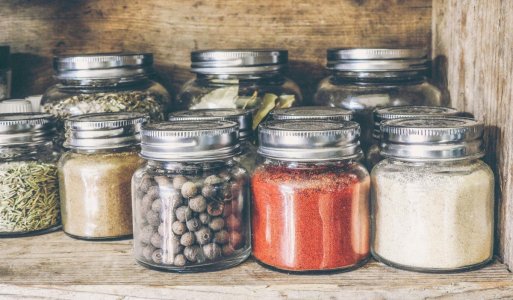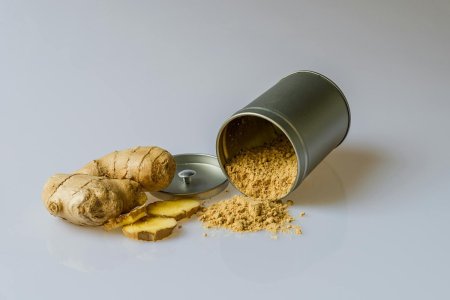Spice rack secrets: Herbs that may support your belly, brain, and more!
By
Veronica E.
- Replies 0
Disclaimer: The information provided in this article is for educational purposes only and is not intended as a substitute for professional medical advice, diagnosis, or treatment. Always consult your physician or other qualified healthcare providers with any questions you may have regarding a medical condition or before making any changes to your health regimen.
You might reach for cinnamon, parsley, or ginger to jazz up your meals—but what if those simple sprinkles were doing a whole lot more?
Science now shows that common herbs and spices could support everything from smoother digestion to better blood sugar and even brain health.
At The GrayVine, we love finding small, enjoyable ways to feel better.
And it turns out that the right herbs and spices can offer some real benefits—no pills or powders required.
Let’s take a closer look at the flavorful heroes hiding in your spice rack!

Oregano: more antioxidants than blueberries?
Best known for livening up pizza or pasta, oregano is packed with inflammation-fighting polyphenols—more than many so-called “superfoods.”
According to a 2022 study, adding just three teaspoons of mixed herbs and spices to daily meals improved gut bacteria and digestion in adults at risk for heart disease.
Other antioxidant-rich spices worth using: cloves, peppermint, star anise, and celery seed.
Cinnamon: a sweet way to support your blood sugar
Studies have shown that cinnamon can help lower blood sugar and cholesterol levels, especially in people with pre-diabetes or type 2 diabetes.
A 2024 study found just 1½ teaspoons a day improved blood sugar control in four weeks.
Just be mindful of the type—Ceylon cinnamon is considered safer than the more common cassia kind, which can be harmful in large amounts due to its coumarin content!
Also read: Unlock the secret battle against Alzheimer's disease hiding in your spice rack
Turmeric: the golden spice with healing power
Curcumin, the active compound in turmeric, is known for its anti-inflammatory effects.
A 2024 review confirmed that curcumin supplements significantly lowered inflammation markers in people with chronic illness.
You’d need a lot of turmeric to match supplement doses—but cooking with turmeric and black pepper together can still give your body a helpful boost over time!
Ginger: your stomach’s best friend
Ginger has long been used to ease nausea, fight inflammation, and soothe upset stomachs.
A recent study even found it reduced nausea and fatigue in chemotherapy patients with just half a teaspoon a day.

Also read: This common kitchen spice could be sabotaging your medications
Peppermint: great for digestion—and your mood
Peppermint oil has been shown to ease symptoms of irritable bowel syndrome (IBS) by relaxing gut muscles and reducing pain, bloating, and cramping.
While tea can help, concentrated peppermint capsules provide the strongest benefits.
Cloves: nature’s dental relief
Cloves contain eugenol, a natural pain reliever that’s long been used to ease toothaches.
One study found clove gel was just as effective as over-the-counter numbing cream for dental pain.
Not a bad backup in a pinch!
Rosemary: brain food in your garden
This fragrant herb may help support energy, mood, and memory.
A 2020 study showed that daily use of rosemary extract improved alertness and mental sharpness in men.
Cooking with it regularly might still offer subtle cognitive benefits.
Also read: The secret spice that could help you shed pounds—is it in your kitchen?
Other spices worth a sprinkle
How much do you need?
You don’t need to eat herbs by the handful.
Just using them regularly in meals—whether it’s a pinch in soup or a sprinkle on eggs—can add up over time.
It’s a flavorful way to support your body naturally!
Quick reminder: Always check with your doctor before adding new herbs or supplements to your routine, especially if you take medications or manage health conditions.
Read next: Discover the game-changing “flavor of the year” McCormick just unveiled!

What’s your go-to spice? Have you noticed a health benefit from adding herbs or spices to your meals? Share your stories, recipes, or questions in the comments—we’d love to hear how you spice up your health naturally!
You might reach for cinnamon, parsley, or ginger to jazz up your meals—but what if those simple sprinkles were doing a whole lot more?
Science now shows that common herbs and spices could support everything from smoother digestion to better blood sugar and even brain health.
At The GrayVine, we love finding small, enjoyable ways to feel better.
And it turns out that the right herbs and spices can offer some real benefits—no pills or powders required.
Let’s take a closer look at the flavorful heroes hiding in your spice rack!

These everyday herbs and spices—like cinnamon, turmeric, and rosemary—aren’t just for flavor. They may help support digestion, memory, and blood sugar health with every sprinkle. Image Source: Pexels / monicore.
Oregano: more antioxidants than blueberries?
Best known for livening up pizza or pasta, oregano is packed with inflammation-fighting polyphenols—more than many so-called “superfoods.”
According to a 2022 study, adding just three teaspoons of mixed herbs and spices to daily meals improved gut bacteria and digestion in adults at risk for heart disease.
Other antioxidant-rich spices worth using: cloves, peppermint, star anise, and celery seed.
Cinnamon: a sweet way to support your blood sugar
Studies have shown that cinnamon can help lower blood sugar and cholesterol levels, especially in people with pre-diabetes or type 2 diabetes.
A 2024 study found just 1½ teaspoons a day improved blood sugar control in four weeks.
Just be mindful of the type—Ceylon cinnamon is considered safer than the more common cassia kind, which can be harmful in large amounts due to its coumarin content!
Also read: Unlock the secret battle against Alzheimer's disease hiding in your spice rack
Turmeric: the golden spice with healing power
Curcumin, the active compound in turmeric, is known for its anti-inflammatory effects.
A 2024 review confirmed that curcumin supplements significantly lowered inflammation markers in people with chronic illness.
You’d need a lot of turmeric to match supplement doses—but cooking with turmeric and black pepper together can still give your body a helpful boost over time!
Ginger: your stomach’s best friend
Ginger has long been used to ease nausea, fight inflammation, and soothe upset stomachs.
A recent study even found it reduced nausea and fatigue in chemotherapy patients with just half a teaspoon a day.

Ginger isn’t just a kitchen staple—it’s known for easing nausea, supporting digestion, and adding a healthy kick to your favorite meals and teas. Image Source: Pexels / Pixabay.
Also read: This common kitchen spice could be sabotaging your medications
Peppermint: great for digestion—and your mood
Peppermint oil has been shown to ease symptoms of irritable bowel syndrome (IBS) by relaxing gut muscles and reducing pain, bloating, and cramping.
While tea can help, concentrated peppermint capsules provide the strongest benefits.
Cloves: nature’s dental relief
Cloves contain eugenol, a natural pain reliever that’s long been used to ease toothaches.
One study found clove gel was just as effective as over-the-counter numbing cream for dental pain.
Not a bad backup in a pinch!
Rosemary: brain food in your garden
This fragrant herb may help support energy, mood, and memory.
A 2020 study showed that daily use of rosemary extract improved alertness and mental sharpness in men.
Cooking with it regularly might still offer subtle cognitive benefits.
Also read: The secret spice that could help you shed pounds—is it in your kitchen?
Other spices worth a sprinkle
- Parsley: High in vitamin K and antioxidants, great for bones and immunity
- Basil: May help reduce stress and inflammation
- Thyme: Contains antimicrobial properties that support immune health
How much do you need?
You don’t need to eat herbs by the handful.
Just using them regularly in meals—whether it’s a pinch in soup or a sprinkle on eggs—can add up over time.
It’s a flavorful way to support your body naturally!
Quick reminder: Always check with your doctor before adding new herbs or supplements to your routine, especially if you take medications or manage health conditions.
Read next: Discover the game-changing “flavor of the year” McCormick just unveiled!
Key Takeaways
- Emerging research shows common herbs and spices like oregano, cinnamon, turmeric, and ginger may provide health benefits, such as reducing inflammation, improving blood sugar control, and supporting gut health.
- Using cinnamon regularly could help modestly lower blood sugar and cholesterol, especially in those with pre-diabetes or type 2 diabetes, but Ceylon cinnamon is safer for frequent use due to lower coumarin content.
- Turmeric contains curcumin, a compound with powerful anti-inflammatory effects; combining it with black pepper when cooking may boost its absorption and health benefits.
- Peppermint, ginger, cloves, and rosemary each have unique properties: peppermint can ease IBS symptoms, ginger can reduce nausea, cloves may relieve toothache, and rosemary could potentially improve mood and memory.
What’s your go-to spice? Have you noticed a health benefit from adding herbs or spices to your meals? Share your stories, recipes, or questions in the comments—we’d love to hear how you spice up your health naturally!






